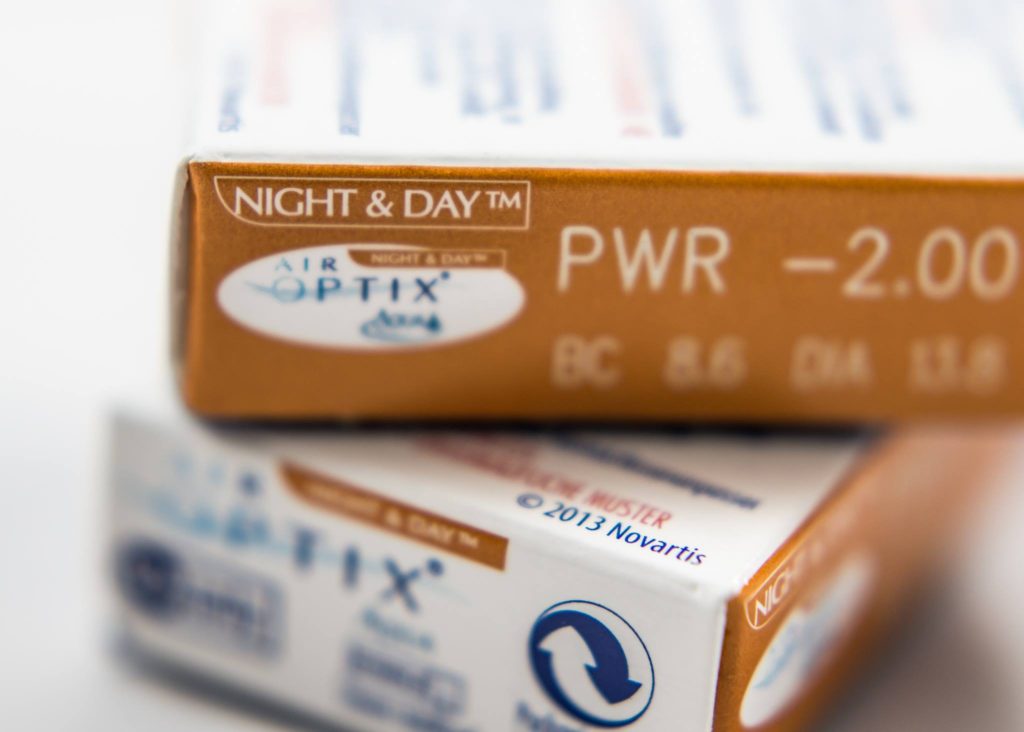Contact Lens Safety: 10 Dos and Don’ts

Contact lenses are AWESOME, but they’re also a medically prescribed device, and can seriously damage your eyes and vision permanently if not handled right. Here’s a little contact lens safety 101 to keep in mind:
1. DO: Wear Contact Lenses According To Their Design.
Not all contacts are created equal. Some are designed to be worn for a month straight. Others are to be worn daily or weekly. Ask your eye doctor which type of lens will be best for you, and be sure you understand how to properly wear the specific kind of lenses he prescribes for you.
Ask questions like, “Can I sleep in these lenses?” “If so, how often do I need to take the lenses out and clean them?” “At what point do I need to change to a new set of contact lenses?” Contact lenses can potentially damage your eyes if not worn properly. But if you understand basic contact lens safety for your specific contacts and stick to their wearing schedule, you can avoid the risk of harming your eyes’ health and your vision.
2. DON’T: Use Generic Contact Lens Solution
Just because generic solution might be a little cheaper, doesn’t mean you are actually getting ahead. Generic solutions are typically a mish-mash of all different kinds of leftover solutions from factories, and a lot of people experience irritation or allergies in response to them. Stay on the safe and healthier side by purchasing name brand solutions like OPTI-FREE, Clear Care, or Biotrue.
3. DO: Wash Your Hands Before Inserting or Removing Contact Lenses.
Always wash your hands before inserting or removing your contact lenses. You may not always be able to see the germs and debris on your fingers, but you are picking them up as you go about your daily life. Washing your hands is easy and basic, but it’s a huge part of contact lens safety. Cleanliness will ensure that you aren’t transferring dirt or harmful bacteria into your eyes.
4. DON’T: Continue to Wear Your Contacts if Redness or Irritation Occur
At the first sign of redness or irritation, it is best to remove your contacts. If you need to use them at the time, take them out and clean them thoroughly before you continue wearing them. This may help if the irritation is being caused by a bit of debris stuck to your contacts. However, if your symptoms persist, it is very important to leave your contacts out and schedule an appointment to see your eye doctor. Redness, pain, light sensitivity, or general irritation can be caused by several potential issues. Infection, inflammation, corneal ulcers, and abrasions all need to be ruled out by your doctor before it is safe for you to continue wearing contact lenses.
5. DO: Regularly Change Your Contact Lens Storage Case.
Changing your storage case every few months is important to contact lens safety. Just like on your lenses themselves, bacteria builds up in the case as your lenses soak while you aren’t wearing them. Cases usually come in the box with any cleaning solution, or can be bought separately at any pharmacy.
6. DON’T: Wear Contacts in Chlorinated Water
Here we go again – bacteria, bacteria, bacteria! High levels of damaging bacteria live in and around chlorinated pools. If this bacteria gets trapped beneath your contact lenses, it can cause a dangerous and hard to treat infection.
7: DO: Build Up Your Wearing Time.
If you are new to wearing contacts, build up your wearing time. Your eye isn’t used to having a piece of silicone in it, and if you take your new contacts and wear them for 14 hours the first day, you’re likely to irritate and beat your eye up a little bit. Your eye will get used to it, but start out the first day with 4 or 5 hours of wearing time, and build up by and hour or two each day until you reach a full day.
8: DON’T: Leave Home Without Your Backup Glasses.
Once you are used to wearing them, contacts are generally very reliable, but you should always carry a backup pair of glasses with you in case of an emergency. If for some reason your begin to experience irritation, a lens rips, or you lose a contact, you definitely don’t want to be stuck somewhere when you can’t see.
9: DO: Schedule Your Yearly Contact Lens Exam To Keep Your Contact Lens Prescription Current.
Contact lens prescriptions are only legally valid for one year. Be sure to schedule your yearly exam to update the power of your lenses if necessary and keep your prescription current.
10. DON’T: Share Your Contacts With Anyone Else!
This might seem like a no-brainer (we hope it does, at least!), but sharing contacts with anyone else puts you at a high risk of infection. Do yourself and your friends a favor – everybody use their own individual prescribed lenses!
Contact Lens Safety – Believe Us When We Say It’s Worth It!
Here at Oil City Eye Associates, we’ve seen our fair share of contact lens horror stories. It is true that you can physically damage your eyes and lose your vision if you abuse your contacts. However, contacts don’t need to be a scary thing if you use them correctly! Living by a few contact lens safety rules will keep your eyes healthy and allow you to enjoy the convenience of contact lenses for years to come.
